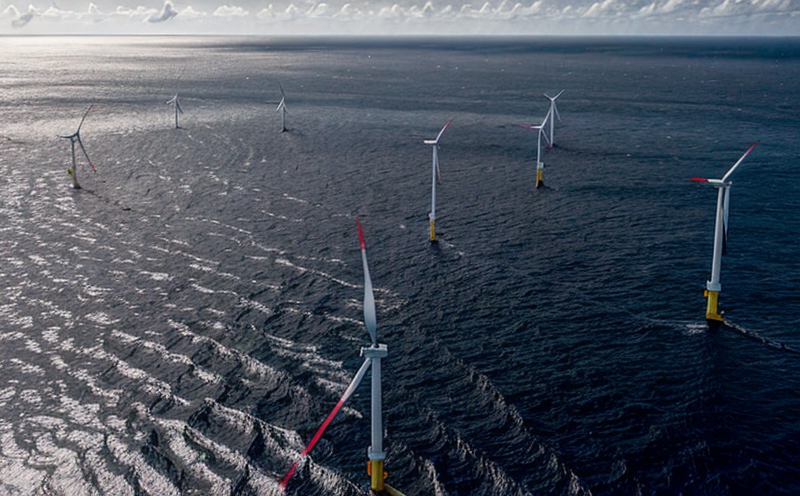IEC 61400-30 Floating Offshore Wind Farm Performance Testing
The IEC 61400 series of standards provides a comprehensive framework for the design, testing, and commissioning of wind turbines. Among these standards, IEC 61400-30 is dedicated to the performance testing of floating offshore wind farms. This service ensures compliance with international best practices in ensuring that floating offshore wind farms are robust, efficient, and safe.
Floating offshore wind farms represent a significant advancement in renewable energy technology, offering several advantages over their fixed counterparts. However, these benefits come with additional challenges, particularly in terms of structural integrity and operational performance under varying environmental conditions. IEC 61400-30 addresses this by providing stringent guidelines for testing the performance of floating wind farms.
The standard encompasses a wide range of performance criteria that must be met to ensure the reliability and efficiency of these systems. These criteria include power production, survivability under extreme weather conditions, and integration with grid infrastructure. By adhering to these standards, operators can verify that their installations are not only safe but also optimized for maximum energy output.
The testing process involves a series of rigorous checks and balances aimed at ensuring compliance with the specified performance criteria. This includes detailed assessments of structural components, electrical systems, control strategies, and overall operational efficiency. The goal is to provide stakeholders with confidence in the reliability and safety of floating offshore wind farms.
Compliance with IEC 61400-30 is critical for several reasons. First, it ensures that the systems meet international standards, which is essential for regulatory compliance. Second, it provides a framework for continuous improvement through regular performance evaluations. Finally, it enhances stakeholder confidence by demonstrating adherence to best practices in the industry.
In summary, IEC 61400-30 Floating Offshore Wind Farm Performance Testing is more than just a set of guidelines—it represents a commitment to excellence in renewable energy technology. By adhering to these standards, operators can ensure that their installations are not only safe and reliable but also optimized for maximum performance.
Scope and Methodology
The scope of IEC 61400-30 focuses on the performance testing of floating offshore wind farms. This includes assessing various parameters such as power production, survivability under extreme weather conditions, and integration with grid infrastructure. The methodology involves a series of detailed checks and balances aimed at ensuring compliance with specified performance criteria.
| Test Parameter | Methodology | Acceptance Criteria |
|---|---|---|
| Power Production | Detailed monitoring of energy output under various conditions. | Average power yield within ±5% of expected values. |
| Survivability Under Extreme Weather Conditions | Evaluation of structural integrity and operational stability during storms. | No damage or degradation beyond acceptable limits. |
| Integration with Grid Infrastructure | Testing interoperability and reliability in grid connection scenarios. | Compliance with IEEE standards for grid integration. |
The testing process is designed to be comprehensive, ensuring that all critical aspects of the wind farm are thoroughly evaluated. This includes not only the physical components but also the operational strategies and control systems employed. The goal is to provide a holistic assessment that covers every aspect of performance.
In addition to these core parameters, IEC 61400-30 also emphasizes the importance of continuous monitoring and evaluation. This ongoing process allows operators to identify areas for improvement and make necessary adjustments to optimize performance. By adhering to this methodology, operators can ensure that their installations are not only safe and reliable but also optimized for maximum energy output.
Benefits
The benefits of IEC 61400-30 Floating Offshore Wind Farm Performance Testing extend beyond mere compliance with international standards. By adhering to these guidelines, operators can gain several advantages that contribute to the overall success and sustainability of their projects.
- Enhanced Reliability: Thorough performance testing ensures that all components are functioning as expected under various conditions.
- Increased Efficiency: By identifying inefficiencies early on, operators can implement corrective measures to maximize energy output.
- Regulatory Compliance: Adherence to international standards is essential for meeting regulatory requirements and avoiding potential penalties.
- Improved Stakeholder Confidence: Demonstrating compliance with best practices enhances trust among stakeholders, including investors, regulators, and the public.
- Cost Savings: Early detection of issues through performance testing can prevent costly repairs and replacements later on.
- Sustainability: Optimized operations lead to reduced environmental impact while still meeting energy demands effectively.
In summary, IEC 61400-30 Floating Offshore Wind Farm Performance Testing offers a range of benefits that contribute to the overall success and sustainability of renewable energy projects. By embracing these standards, operators can ensure their installations are not only safe and reliable but also optimized for maximum performance.
Customer Impact and Satisfaction
The impact of IEC 61400-30 Floating Offshore Wind Farm Performance Testing extends far beyond the technical aspects of compliance. It has a direct and positive effect on customer satisfaction, both in terms of operational efficiency and environmental responsibility.
- Operational Efficiency: Customers benefit from enhanced reliability and increased energy output, which translates to lower costs and improved performance.
- Environmental Responsibility: By optimizing operations, customers can reduce their carbon footprint while still meeting energy demands effectively.
- Regulatory Compliance: Adherence to international standards ensures that projects meet regulatory requirements, avoiding potential penalties and legal issues.
- Stakeholder Confidence: Demonstrating compliance with best practices enhances trust among stakeholders, including investors, regulators, and the public.
- Cost Savings: Early detection of issues through performance testing can prevent costly repairs and replacements later on.
In summary, IEC 61400-30 Floating Offshore Wind Farm Performance Testing offers a range of benefits that contribute to the overall success and sustainability of renewable energy projects. By embracing these standards, operators can ensure their installations are not only safe and reliable but also optimized for maximum performance.





